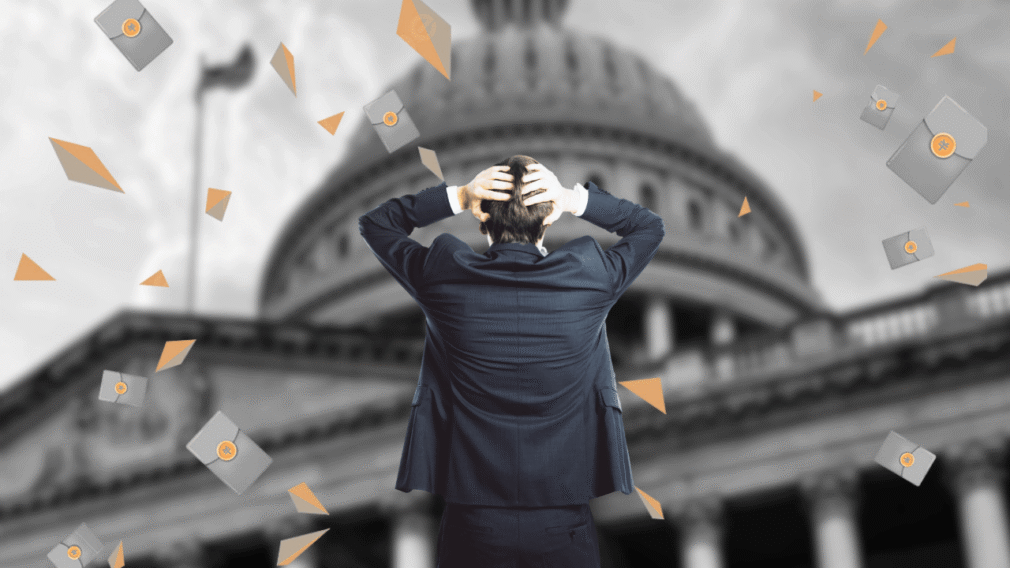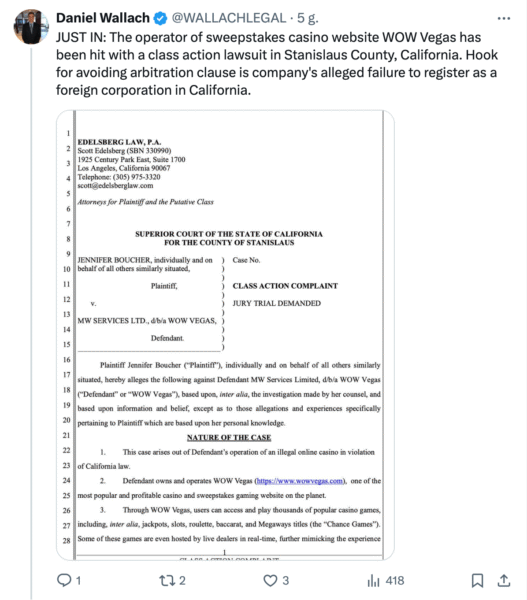“Black Tuesday” Shakes the Sweepstakes Industry: Louisiana’s Victory Was Short-Lived
Amid mounting regulatory pressure, the sweepstakes industry recently had moments of respite and even a small victory in Louisiana, where the governor vetoed an anti-sweepstakes bill. Tuesday, however, brought a swift return to reality, as three states took concrete actions against operators. Among industry experts, June 17 has already been dubbed “Black Tuesday” for sweepstakes. What happened?

Louisiana’s Two Faces
Last week saw two significant developments regarding the legal status of sweepstakes. As expected, Connecticut Governor Ned Lamont signed Senate Bill 1235, making The Nutmeg State one of the few to ban this growing sector through legislation.
In stark contrast, Louisiana’s SB 181 met a different fate. Despite similar expectations of an impending sweepstakes ban, it was vetoed by Governor Jeff Landry, even after unanimous approval by the state legislature. Landry argued that existing regulators already effectively combat illegal gambling. “This bill isn’t necessary. This is a solution in search of a problem,” he wrote, noting, “The Board is taking active steps against illegal online sweepstakes companies.”
It seems the Louisiana Gaming Control Board (LGCB) took this as a call to action. On Tuesday, the LGCB issued a series of cease-and-desist orders to operators offering illegal gambling in the state. Harp Media B.V., operating as Bovada, was explicitly named, but it’s reasonable to assume sweepstakes operators were also targeted in this broad sweep.
Christopher B. Hebert, LGCB Chairman, stated: “These actions send a clear message. Louisiana will not tolerate illegal operators who put our citizens at risk and undermine the fairness and integrity of our gaming industry. We will continue to use every enforcement tool available to protect the public and uphold the law.”
Despite Governor Landry’s veto, sweepstakes took a heavy blow in Louisiana. “Win the battle, lose the war,” commented legal expert Daniel Wallach in an X post, who first reported Tuesday’s events. But Louisiana wasn’t the end of the story.
One Mississippi, Two Mississippi
That same day, the Mississippi Gaming Commission (MGC) got to work, issuing cease-and-desist letters to ten offshore and sweepstakes operators. We know at least one went to VGW’s Chumba Casino.
The MGC justified its actions, stating these firms violate state and federal law:
“The Mississippi Gaming Commission has issued cease and desist letters to multiple online gambling sites found operating illegally in Mississippi. Letters were issued electronically and by mail to companies operating sports wagering and/or online casinos in contravention of state and federal laws, including but not limited to, Mississippi criminal gambling laws at Miss. Code Ann. § 97-33-1, et seq., the Mississippi Racketeer Influenced and Corrupt Organization Act, Miss. Code Ann. § 97-43-1, et seq., the Mississippi Gaming Control Act, Miss. Code Ann. § 75-76-1 et seq., the Unlawful Internet Gambling Enforcement Act of 2006, 31 U.S.C. § 5361 et seq., the Federal Wire Act of 1961, 18 U.S.C. § 1081 et seq., and the Illegal Gambling Business Act, 18 U.S.C. § 1955. The online wagering offered by these sports book and gaming sites is illegal in Mississippi, as wagers may only be offered and accepted on the premises of, and by an establishment authorized by Mississippi law or Tribal Compact.”
MGC Executive Director Jay McDaniel made clear that online casino-style games and sports betting are prohibited outside licensed casinos: “Our laws are clear that casino-style gaming and sports wagering are not allowed online in Mississippi, outside of a licensed casino.”
McDaniel also emphasized the MGC’s aggressive pursuit of illegal operators, noting these firms mislead residents and provide no tax revenue or tangible benefits to the state: “The MGC will aggressively pursue both domestic and offshore illegal operators, and the MGC is currently providing criminal case files to our state and federal law enforcement partners and requesting prosecution. Companies like those put on notice today mislead our residents by claiming to be legal outlets, when in fact they operate illegally and without providing any tax revenue or other tangible benefit to Mississippi.”
The sweepstakes industry was hit with a second bolt from the blue, with both Daniel Wallach and Howard Glaser, Global Head of Government Affairs at Light & Wonder, calling the day “Black Tuesday,” alluding to the infamous “Black Friday” that wiped out online poker.
Empire State of Mind
To top it off, in New York, Senator Joseph Addabbo’s sweepstakes ban bill passed the Assembly, meaning New York is one governor’s signature away from becoming the fourth state to outlaw sweepstakes. The bill targets not only operators but also banks and payment processors supporting them.
For context, New York’s 2025 efforts to address sweepstakes began with a proposal to regulate them. However, the bill evolved unfavorably for sweepstakes, placing the industry’s fate in Governor Kathy Hochul’s hands.
The Social and Promotional Games Association (SPGA) has already urged Governor Kathy Hochul to veto the bill. “The Social and Promotional Games Association (SPGA) strongly urges Governor Kathy Hochul to veto SB5925, a shortsighted bill that threatens to kill investment, stifle innovation, and undermine New York’s position as a national leader for tech and digital entertainment,” reads their official statement.
“This bill doesn’t just target sweepstakes, it sends a chilling message to anyone looking to invest in the next generation of gaming innovation,” added an SPGA spokesperson.
New York will likely soon join Montana, Nevada, and Connecticut, which have, directly or indirectly, banned sweepstakes through legislation. Ultimately, this may prove less significant than Tuesday’s events in Louisiana and Mississippi.
New York had already taken decisive action against sweepstakes. On June 9, New York Attorney General Letitia James, in collaboration with the New York State Gaming Commission, shut down 26 online casinos deemed illegal. Anticipating trouble, some operators, like VGW (operator of Chumba, Luckyland, and Global Poker), began withdrawing from New York before the AG’s crackdown. Others left after June 9.
Here, Governor Landry’s argument about duplicating existing efforts could apply. Regardless, New York has quickly become hostile territory for sweepstakes.
What Now?
Thus, Tuesday, June 17, became “Black Tuesday” for sweepstakes. This could embolden regulators in other states to act more decisively. While not necessarily a direct result of Tuesday’s events, it’s worth noting Daniel Wallach’s latest report from California, where sweepstakes operator WOW Vegas faces a lawsuit in Stanislaus County.
Wallach also offers predictions, suggesting we may see the first lawsuit challenging a cease-and-desist order. “Cease-and-desist orders from state agencies can be challenged in court. We’re seeing that now with Kalshi. Sweeps operators have been hit with more than 100 C&D orders—and not one has ever been judicially challenged. Perfect opportunity for a test case,” he wrote on X.
This is certainly a possibility, especially as, with mounting pressure, sweepstakes operators and their associations have less to lose.
Recommended

